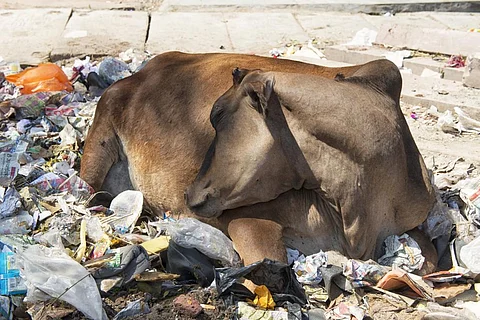

The Union Ministry of Environment, Forest & Climate Change (MoEF&CC) has mechanisms to assess the generation of plastic waste, but none for its collection and safe disposal, found a compliance audit by the Comptroller and Auditor General (CAG) of India December 21, 2022.
Plastic Waste Management (PWM) Rules, 2016, could not be implemented effectively and efficiently due to a lack of an action plan by the MoEF&CC, the report further said. The ministry is also lacking in effective coordination with pollution control boards, it said.
The ministry was also silent about the existence of a policy for plastic waste reduction, reuse and recycling, CAG observed in its audit.
The audit report said:
The MoEF&CC stated to have adopted a three-pronged strategy for effective implementation of the rules, which include behavioural change; strengthening of the institutional system for the collection, segregation and recycling of plastic waste; and engagement with producers, importers and brand owners through Extended Producer’s Responsibility.
But the ministry did not have an action plan for the effective implementation of the said strategy for 2015-20, it found. “The preparation of a comprehensive action plan was initiated in May 2021 and is still underway,” CAG said.
“The stakeholders — MoEF&CC, Central Pollution Control Board (CPCB), State Pollution Control Boards (SPCBs) — are not working in tandem to control generation, putting effective system for collection and safe disposal of plastic waste,” the CAG report observed.
The Plastic Waste Management Rules framed by MoEF&CC lack comprehensiveness to give thrust to effective implementation and monitoring thereof, it added.
The audit aimed to assess the effectiveness and compliance of the provisions of Plastic Waste Management Rules to examine their adequacy in managing plastic waste. It also addressed the risks posed by plastic waste to the environment and health.
Details of plastic waste generated across the country from 2015-16 to 2019-20
|
Year |
Plastic waste generated (Tonnes per day) |
|
2015-16 |
4,354.57 (information from 19 states/Union Territories) |
|
2016-17 |
4,297.80 (information from 21 states/UTs) |
|
2017-18 |
1,810.30 (information from 14 states/UTs) |
|
2018-19 |
9,205.59 (information from all 35 states/UTs) |
|
2019-20 |
9,506.20 (information from all 35 states/UTs) |
CAG selected several bodies to review records for 2015-16 to 2019-20.
These were 18 wards from six zones of three Urban Local Bodies (ULBs) in Delhi, eight ULBs and thirty Rural Local Bodies (RLBs) from six sampled districts in Punjab and four ULBs and nine Panchayati Raj Institutions (PRIs) from three districts in Sikkim.
A compliance audit of 92 out of 448 units was conducted from 2019 to 20. An audit of 100 out of 352 units was carried out in 2020-21 based on available resources and risk assessment, which included Central Public Sector Enterprises of Scientific and environmental ministries/departments.
A reliable assessment of waste generated is essential for planning and effective implementation of waste management, which can guide in decision-making. Hence, data of assessment of plastic waste is the first step towards effective policymaking, the audit report said.
There is no uniform method for assessment of plastic waste generation within a state, the report further said. For instance, the data of plastic waste generation reported by ULBs was based on assumptions without any sound rationale, it found.
“In Delhi, [erstwhile] East Delhi Municipal Corporation and New Delhi Municipal Council assumed the plastic waste generation to be 10 per cent of the total municipal solid waste. On the other hand, [erstwhile] South Delhi Municipal Corporation calculated it at the rate of 4.4 to 6 per cent of the total waste generated,” the report said.
Waste collection, recycling, co-processing and its ultimate disposal in scientific and environment friendly manner are essential elements of plastic waste management system, the report added.
Millions of tonnes of plastic waste are lost to the environment or sometimes shipped thousands of kilometres to destinations where it is mostly burned or dumped. If incinerated, its toxic compounds are spewed into the atmosphere to be accumulated in biotic forms throughout the surrounding ecosystems.
When buried in a landfill, plastic lies untreated for years. In the process, toxic chemicals from plastics drain and seep into groundwater, flowing downstream into lakes and rivers. The seeping of plastic also causes soil pollution due to the presence of microplastics in the soil.
Rivers and lakes also carry plastic waste from deep inland to the sea, making them major contributors to ocean pollution.